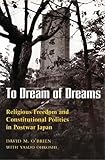To Dream of Dreams : Religious Freedom and Constitutional Politics in Postwar Japan / David M. O'Brien.
Material type: TextPublisher: Honolulu : University of Hawaii Press, [1996]Copyright date: ©1996Description: 1 online resource (312 p.)Content type:
TextPublisher: Honolulu : University of Hawaii Press, [1996]Copyright date: ©1996Description: 1 online resource (312 p.)Content type: - 9780824865191
- 342.52/0852 345.202852 20
- KNX2472 .O27 1996eb
- online - DeGruyter
| Item type | Current library | Call number | URL | Status | Notes | Barcode | |
|---|---|---|---|---|---|---|---|
 eBook
eBook
|
Biblioteca "Angelicum" Pont. Univ. S.Tommaso d'Aquino Nuvola online | online - DeGruyter (Browse shelf(Opens below)) | Online access | Not for loan (Accesso limitato) | Accesso per gli utenti autorizzati / Access for authorized users | (dgr)9780824865191 |
Frontmatter -- Contents -- Preface -- Acknowledgments -- Chapter 1. The Nail That Sticks Up -- Chapter 2. Paradoxes Of (Dis)Establishment -- Chapter 3. Manipulating Law’S Social Reality -- Chapter 4. Past Remembering -- Chapter 5. Enshrinements For Tomorrowland -- Chapter 6, Cool Minds, Warm Hearts -- Appendix A. Caseloads Of Courts In Japan -- Appendix B. Individual Opinion Writing On The Supreme Court Of Japan, 1981–1993 -- Notes -- Select Bibliography -- Name And Subject Index -- Case Index -- About The Author
restricted access online access with authorization star
http://purl.org/coar/access_right/c_16ec
Prior to World War II, State Shinto, which was centered on the worship of the emperor and Yasukuni Shrine's cult of war dead, was established in support of the government and militarism. Since the end of the Occupation, Japanese conservatives have sought to restore State Shinto's institutions even as expanded military budgets have placed Japan among the top five countries in defense spending. This timely book focuses on the struggles against government attempts to revive "the emperor system" and Japan's prewar military presence. Organized around case studies and based on extensive interviews, To Dream treats the operations of the Japanese court system thoroughly and uncovers important cases regarding religious liberty that remain little known even among specialists on modern Japanese history and society. It shows that litigation has been brought by pacifists, liberals, and others fiercely opposed to renewed militarism and to governmental support for the symbolism and institutions of State Shinto. Throughout, the author offers important information on the composition of courts involved and the attitudes of specific judges and provides translated texts of significant judicial decisions, in the process dispelling the stereotype of the Japanese as "reluctant litigants."
Mode of access: Internet via World Wide Web.
In English.
Description based on online resource; title from PDF title page (publisher's Web site, viewed 02. Mrz 2022)


